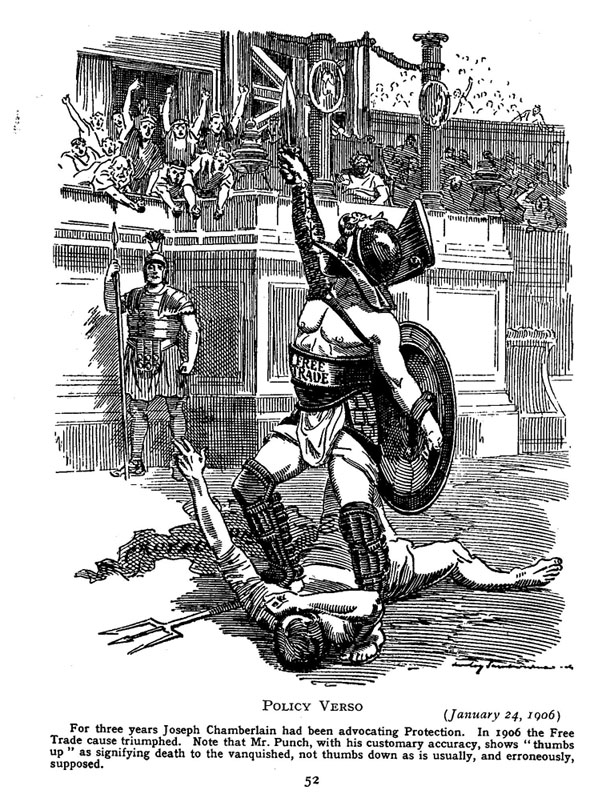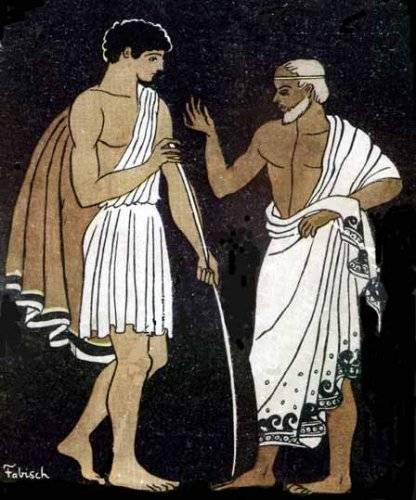Before setting sail for Troy to join battle in the Trojan War, Odysseus entrusted the care of his infant son, Telemachus, with his old friend Mentor. Eventually, as Telemachus grew up and started assuming duties as head-of-household in Odysseus’s long absence, Athena, disguised as Mentor, advised him to stand up to all of his mother’s suitors, search for his long-lost father, and eventually defend the family’s honor.
(An illustration of Telemachus and Mentor from François Fénelon’s The Adventures of Telemachus c. 1699. Source: Wikipedia)
Throughout the centuries, indeed the millennia, the term mentor has come to mean an older individual that takes a special interest in the personal development and learning of a younger person. This mentor will impart his/her wisdom and knowledge to a pupil or protégé, whether trade-related through an apprenticeship or through life lessons procured through years of successes and failures. But a mentor isn’t necessarily a formal teacher. Usually they are someone more mature in their career and life that for whatever reason takes a liking to younger person. And they personally see to it that their mentee grows, matures, and eventually realizes his/her dreams.
There have been many famous mentor relationships over the years, ranging from every sort of field and industry imaginable. Aristotle, for instance, was a mentor to Alexander the Great, George Washington was one to Alexander Hamilton, and Dr. Dre to Eminem. Another particular but lesser known mentor relationship of great consequence for world history was that between William Bourke Cockran and Winston Churchill.
 (Portrait of William Bourke Cockran. Source: Wikipedia)
(Portrait of William Bourke Cockran. Source: Wikipedia)
Before Michael McMenamin and Curt Zoller’s fascinating book, Becoming Winston Churchill: The Untold Story of Young Winston and his American Mentor, not much was written about Bourke Cockran’s influence on the man that would very nearly save Western civilization. McMenamin and Zoller describe Cockran as “an American, an Irish-born, French-educated lawyer and Democratic Congressman from New York City, a close friend of Churchill’s American-born mother… [he is] a near-forgotten figure in American political history who served as the young Winston Churchill’s mentor, unselfishly helping his protégé formulate his political thought and develop his speaking style.”
Shortly after the death of Churchill’s father, Lord Randolph Churchill whom served as Chancellor of the Exchequer for the House of Parliament, his mother, the American-born actress Jennie Jerome, had a chance encounter with Cockran. They had only a brief affair, but remained close acquaintances thereafter. Having lost his father when he was only 20 years old, Churchill found a mentor and indeed father-figure in Cockran, who had no children of his own.
Though it was to be six more years before he was elected as a Member of Parliament (MP) at the age of 26, Churchill knew his destiny was to follow in his father’s footsteps and wished more than anything to pursue a career in politics. As a cavalry officer in the 4th Hussars, eventually participating in one of last cavalry charges in history, Churchill began his political education by devouring books and newspapers. Churchill read everything from Edward Gibbon’s Decline and Fall of Roman Empire, Plato’s Republic, and Thomas MacCaulay’s poems. It was in The Annual Register, however, where he truly began developing opinions of his own on the political and economic affairs of the British Empire.
First written and edited by the famous Irish statesmen and political philosopher Edmund Burke in 1758, The Register provided an account of all the noteworthy events and developments of the year. Churchill just didn’t read the Register, he contemplated and assessed all matters and wrote in the margins of the book his thoughts and opinions. Through this process, he began developing his guiding worldview and subsequently started forging the foundations of his political thought.
Bourke Cockran came along at just the right time in Churchill’s life. McMenamin and Zoller discuss a study done by Yale psychologist Daniel Levinson. Levinson indicates that in a young man’s “Novice Phase”, the transition between childhood and full adulthood (years 18-30), a mentor serves as a transitional figure, a “mixture of parent and peer”. And during those transition years, a young person is essentially trying to fully define his/her career vision and figure out how to achieve it. So for Churchill at the age of 20, McMenamin and Zoller write, “Cockran was the first and, for some time, the only man to support and then facilitate the realization of the young Churchill’s dream of a life in politics.”
As one of the most talented orators in the United States in the late 19th Century, Cockran’s speech writing and delivery abilities served as a model for Churchill. Churchill consistently read Cockran’s speeches, analyzing not just the text for insights into political philosophy but for crowd reception as well. For the Presidential Election of 1896, speaking on behalf of the Democratic candidate William Jennings Bryan, Cockran delivered the most famous speech of his career at the Madison Square Garden. He discussed such complex (and many would think boring) topics as monetary policy in language that the layman could understand and relate to, a practice which Churchill perfected in his later years. In a written response to Cockran on his speech, Churchill congratulates him “most heartily upon what was not only a rhetorical triumph but also a moral victory.” By reading and discussing Cockran’s speeches, Churchill began emulating not just his speech writing and delivery abilities but the content within as well.
 (British political cartoon denoting the victory of the free traders. Source: Wikipedia.)
(British political cartoon denoting the victory of the free traders. Source: Wikipedia.)
Trade policy was one of the most pressing issues of the day for both the United States and the British Empire. Then, in the late 19th and early 20th Centuries, the Democratic Party supported free trade, which Cockran as one it’s most fervent and articulate advocates. Churchill’s natural inclinations were toward free trade, but his Tory Party sided with the propertied class which had an interest in protective tariffs to keep prices for their goods artificially high. Deeply read in such free-market economic thought as Adam Smith, Cockran served as a teacher to Churchill. He provided him with book recommendations and he explained the economic and moral arguments for free trade that would strengthen Churchill’s convictions.
Churchill’s convictions for free trade and free market economics grew so strong that he soon faced what Cockran would describe to him as “very probably the crisis of your career.” This crisis was his decision to buck the Tory Party over the issue of free trade and cross the floor. Crossing the floor quite literally means to walk across the floor of the House of Parliament from one side to the other, leaving your party to defect to another. It was, and still is, a generally frowned upon practice because it leaves a lingering feeling of suspicion toward the MP. Indeed, even after many years (albeit with another crossing), Churchill’s motivations were still held suspect and many fellow MPs questioned his ability to be loyal to his party. However, Churchill crossed the floor both times in the name of principle, not opportunity. As he explained later: “To remain constant when a Party changes is to excite invidious challenge… Still, a sincere conviction, in harmony with the needs of the time and upon a great issue, will be found to override all other factors; and it is right and in the public interest that it should.” Cockran inspired confidence and courage in Churchill throughout this personal crisis, explaining that “the judgment of which men fairly unbiased will form of you, now, is very likely the one that will follow you through life.” Despite oftentimes being resented by his fellow party members throughout his career, he is indeed remembered as one of the most principled statesmen in world history.
***
If anyone knows me they know that I greatly value mentorship relationships; in fact, I strongly believe that I wouldn’t be where I am today if it weren’t for the mentors throughout my life. And on the flip side, I wouldn’t be as happy as I am if I didn’t have the opportunity to be a mentor.
I have found that finding a good mentor is oftentimes the product of luck: being the right place at the right time. And for a lot of people, finding a mentor – someone to take an active interest in their success – is a real challenge. They live out in the middle of nowhere or work in a place where no one seems to care about anyone else.
If that’s the case, there are other ways to proactively find a mentor. Is there someone you want to get to know better in your community, say a professor, political figure, athlete, or business person? Send them an email opening up a dialogue. Express your admiration for their work and your desire to learn more about their field. Ask if they’d be willing to have lunch or coffee with you. You’ll be surprised: people are more often than not flattered that a younger person respects them and their work. They are often very willing and even happy to meet with someone eager to learn. And don’t get discouraged if they turn your down. If they’re someone you admire then they’re probably busy and have a lot on their plate. But, if they repeatedly turn you down then move on to the next person. But whatever you do, don’t get discouraged.
As McMenamin and Zoller conclude, “adult developmental studies show that successful mentoring relationships for men are the exception, not the rule. Successful mentoring relationships are rarer still. Good mentors represent skill, knowledge, virtue and accomplishment, qualities for a young man to emulate. Good mentors offer a young man love, admiration and encouragement in his struggles. Good mentors combine the qualities of a good father and a good friend. Cockran offered all this to Churchill and more, and at an early age, Churchill absorbed and internalized what he learned at Cockran’s feet.” While it’s impossible to judge Churchill’s career without Cockran, it is clearly evident that he greatly and positively influenced his career and person. His life, as he has indicated, was greatly enriched through the relationship he developed with Bourke Cockran.
There is a lot to be gained by developing a strong mentor relationship with someone. Trust me, it is worth the initial struggle finding one. And conversely, serving as a mentor to a younger person is deeply rewarding, so don’t hesitate to find a mentee.

{ 1 comment }
that was great,goes to show you anyone can be successful if you try.I was wondering have you found any women who came from nothing and did some tinkering to make this world a better place,and didn,t neccesarily get rich?
Comments on this entry are closed.